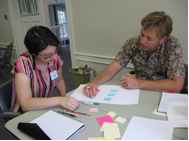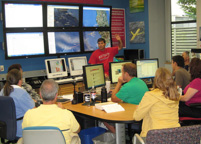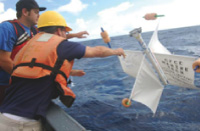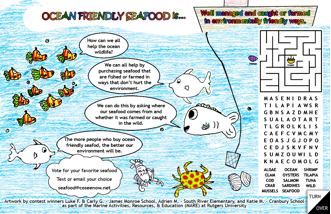COSEE Networked Ocean World (NOW) is focused on finding ways to foster collaborations among scientists and educators, especially those working in the ocean observing systems (OOS) community, to promote teaching and learning in the ocean sciences. During the past year, COSEE NOW has added additional collaborative tools to its website, worked with scientists on the broader application of their research, and developed a suite of educational resources for formal and informal education settings. Intrigued? See the highlights below for more detail.
COSEE NOW Membership Update
With the addition of 121 new users (bringing the total number of registered users to 420) and over 400 new friendship requests this year alone, the COSEE NOW website is still growing in both numbers and activity. COSEE NOW has worked to continue to expand the ability of members to collaborate by adding a number of new features and communities to its website. Thirteen new workgroups - including a variety of topical, programmatic, and event-based options - and four new community blogs were introduced this year. Using these workgroups and blogs, online communities can form as users participate in forum discussions, share resources, and send email alerts of notable news. If you have not joined us, please check us out and consider adding your expertise to our membership.
Scientists Break Down…Their Science
COSEE NOW is working on providing professional development training and mentorship for scientists interested in broadening the impact of their research.
 | |
Rutgers scientist Dr. Oscar Schofield and COSEE-OS associate Carla Companion work to create a concept map of Oscar's science | |
Training and Professional Development for Scientists: In collaboration with COSEE-Ocean Systems (COSEE-OS), COSEE NOW hosted a scientist workshop at Rutgers University focused on helping scientists deconstruct their science, in order to be able to present it to those outside their discipline. The workshop was well attended, including 5 senior faculty members and 21 graduate students and post-doctoral researchers from Rutgers University. To further help the scientists address their audiences using this deconstructed science, the workshop also included a panel discussion on the different types of audiences with which scientists may interact. Staff from the American Museum of Natural History and Liberty Science Center (LSC), an independent radio producer, and an elementary school principal served on the panel. They shared their expertise to help the workshop participants understand what to expect when dealing with K-12 students in formal classrooms, informal education experiences (exhibits, floor programs, classroom programs), radio and/or television productions.
This event is the first of many workshops that will be run as part of a scientist professional development program designed by COSEE NOW, COSEE-OS, COSEE OCEAN, and COSEE California, as well the education and public outreach committee of the American Society of Limnology and Oceanography (ASLO). This workshop series incorporates both face-to-face and online offerings and is designed to includes discussions and demonstrations to address skills such as:
- Deconstructing your science for those outside your discipline
- Understanding learning theory and applying it to your teaching and presentations
- Using social networking tools to broaden your reach and expand your network of colleagues
Broadening Scientists’ Impact: Along with training, COSEE NOW has also collaborated on a number of Broader Impact projects for National Science Foundation (NSF) projects. One of the most recent and most successful projects was associated with a research mission to the Ross Sea in Antarctica. The project, which began in the summer of 2010 and ended in May 2011, consisted of several components:
| |  |
| Dr. Josh Kohut explains to middle and high school teachers how an underwater glider will be used to study the Ross Sea |
- A multi-disciplinary teacher-education team that included educators, scientists, Web 2.0 technology experts and storytellers, and a photographer/writer blogging team
- Twenty-five middle-school and high-school earth science teachers, from New Jersey, New York and California
- Weeklong summer teacher institute at LSC at which participating teachers and scientists met, and teachers learned about questions to be investigated and technologies to be used during the mission, and how to do the science to be conducted in Antarctica
- COSEE NOW interactive community website on which teachers, LSC staff and other COSEE NOW members shared lesson plans and activities, and discussed issues related to implementing the mission-based science in their classrooms
- Technological support and consultations for teachers, plus online practice sessions on the use of Web 2.0 technologies (webinars, blogs, digital storytelling, etc.)
- Daily shipboard blog from the Ross Sea created by Chris Linder and Hugh Powell (a professional photographer/writer team) and posted on the COSEE NOW website to keep teachers and students up-to-date in real-time on science experiments, discoveries and frustrations, as well as shipboard life
- Live webinar calls from the Ross Sea, facilitated by Rutgers and LSC staff, in which students posed questions and interacted directly with shipboard researchers and staff
- A follow-up gathering of teachers and scientists near the end of the school year to debrief on the mission and preliminary findings.
This project resulted in not only the professional development of teachers, which extended into the classroom and to students, but also in the development of relationships between teachers and students and the scientists and the science. Teachers and students connected to scientists via personal and virtual interactions, while engaged in the science process in the classroom and in the field.
Ocean Observatories, Education, and Outreach
One of the main goals of COSEE NOW is to make Ocean Observing information and data available and usable to public audiences. NOW members continue to work toward this goal, engaging in a variety of programs dedicated to bringing real time data to the public.
| |  |
| Students at Cape Fear Community College launch their ocean drifter |
Real Time Data in the Community College Classroom: The MATE Ocean Drifter Project provides community college faculty with the opportunity to learn more about Ocean Observing Systems (OOS), and to actively participate in OOS by understanding the science and technology behind ocean drifters. This year a workshop was offered to teach faculty how to integrate drifter data with other remotely sensed data through the use of Google Earth. Faculty and scientists created animations in Google Earth to demonstrate how oceanographic parameters are interconnected on both spatial and temporal levels.
COSEE NOW Joins the Ocean Observing Initiative (OOI): COSEE NOW is working on developing plans for visualization tools and classroom demonstrations involving real time data, appropriate for university undergraduate and graduate classes. With the announcement of Rutgers University and the University of Maine as the awardees for the OOI Education and Public Engagement (EPE) Implementing Organization (IO), COSEE NOW and COSEE OS will be participating in resource development for undergraduate professors using real time data from the OOI IOs.
Real Time Data in Informal Learning Institutions: A series of seven new real time data (RTD) lesson plans were posted on the COSEE NOW website. COSEE NOW is working on a real time data framework that maps the type of data (real time, near real time, synthesized, archived, student collected, etc.) against lesson objective (introduction, manipulation and interpretation, generation).
COSEE NOW Goes to School
Ocean Residencies at Liberty Science Center: COSEE NOW continues to bring ocean science into the classroom through its programming. The LSC education team taught 208 students from ten Newark, NJ high schools through the Ocean Residency program, which focuses on the physical, chemical, and biological characteristics of the ocean. In offering this program to students from such a highly diverse school system, LSC was able to introduce ocean science to a population that is underrepresented in ocean science related careers. Paired pre-post survey results indicated that this program increased students' awareness of and knowledge about the physical and chemical characteristics of the ocean (density, salinity, currents, layers, etc.); the ocean's impact on their daily lives (from seafood to weather); and scientists' ability to do their research remotely.
| |  |
| Placemat created by MARE students, focusing on
sustainable seafood practices |
Bringing the Ocean to the Classroom with the Marine Activities Resources & Education (MARE) Program: COSEE NOW encourages and supports the inclusion of current ocean science research in elementary and middle school classrooms through the Marine Activities, Resources, & Education (MARE) program. Teachers participated in an intensive weeklong summer program focusing on inquiry-based science learning and emphasizing the importance of providing students with the opportunity to collect and analyze data. The culmination of this program was three Ocean Day events on the campus of Rutgers University, during which students presented to scientists and to each other about their experiences in the MARE program. Students also participated in a poster contest to illustrate and share their ideas on sustainable seafood. Most recently, MARE students unveiled their award-winning educational poster at a local New Jersey seafood restaurant. The posters, which were translated into educational paper placemats, were intended to encourage kids to learn about sustainable seafood practices and how science can be used in everyday life - including making decisions about the seafood we eat and about the importance of buying and eating local seafood. The placemat also provides an opportunity for restaurant-goers to text COSEE NOW with their vote for their favorite New Jersey seafood.
This project was the result of NSF-funded broader impact statement on grant# 0909484 with Drs. Bonnie McCay, Eric Powell, and Dale Haidvogel. COSEE NOW supported the outreach work with the teachers and students, the production of an Ocean Gazing podcast, and the project website.
Ocean Gazing
The aim of Ocean Gazing podcasts is to provide scientists with a forum for telling their stories about ocean observing science and the broader impacts that science is having on people beyond academic institutions. In each of our 50 episodes, Ocean Gazing integrates interviews, ambient sounds gathered in the field and the lab, plus music and audio recordings from listeners (from children to adults). COSEE has begun a redesign and reorganization of the Ocean Gazing website, which makes the content of the podcast easier to locate through enhanced text, discipline, and map searching functionality. It also contains a Teacher Zone specifically designed for K-12 teachers to match each episode with associated lesson plans and all relevant National Science Education Standards, Ocean Literacy Standards, and Climate Literacy Standards.
Visit COSEE NOW!

